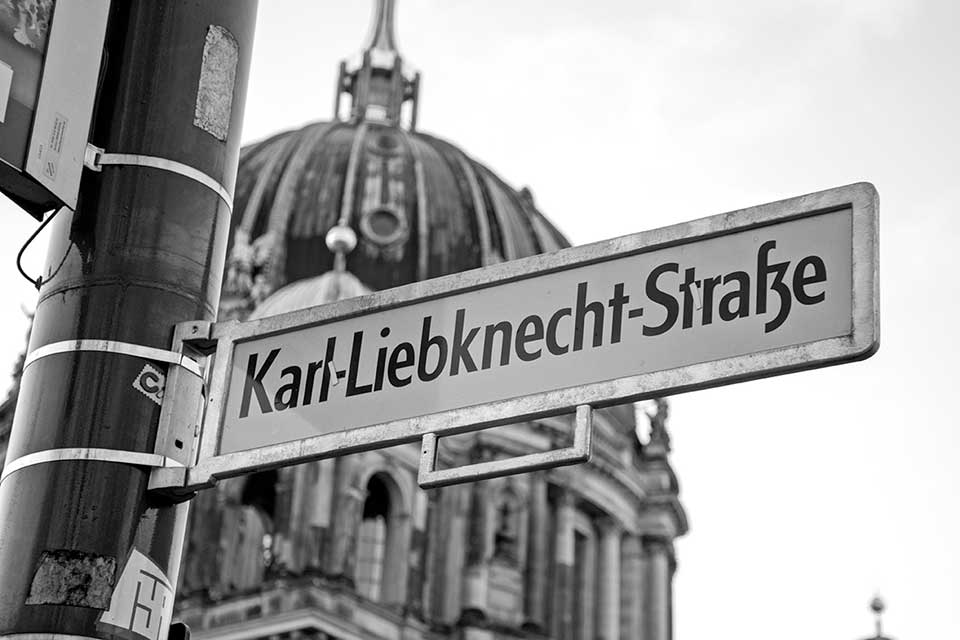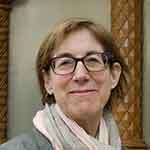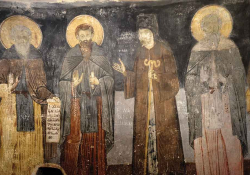When I Left “Karl Liebknecht” (an excerpt)

In the Karl Liebknecht House in Leipzig, Germany, thirty people of various nationalities are seated around an improvised table on the stage in the Events Hall, interpreters behind them, some with texts in front of them, some without, and while it looks as if they’re at an ordinary meeting, they are, in fact, at an exceptional one, one that could be called a performance. They are taking part in a pilot project organized by the Society of Admirers of Karl Liebknecht of Leipzig, which, on January 19, 2018, in recognition of the ninety-ninth anniversary of the death of Karl Liebknecht—the great German leftist and colleague of Rosa Luxemburg—had invited them, all migrants who, prior to their emigration, had lived at an address either bearing his name or having some other connection with him. Some had changed addresses temporarily, others had moved away forever, some wanted to leave, some never completely left, and yet others were connected in some particular way with places named “Karl Liebknecht.” The call was announced publicly, and it generated a great deal of interest, but in the end, thirty people were selected. The hall is completely packed—residents of Leipzig, most others somehow connected with Karl Liebknecht, of whom a majority were also members of the Society of Admirers of Karl Liebknecht—all showing great interest in the event.
After a short speech by a representative of the Society of Admirers of Karl Liebknecht, people were given the opportunity either to speak freely or to read from a prepared text, each in his or her own way, in whatever manner they wished and considered appropriate, about how their Karl Liebknecht address had left its mark on them, both while they were living there and afterward.
Michael: Cottbus, Germany – Bosnia – Serbia – Kigali, Rwanda
My name is Jakob, I am here on behalf of my brother, Michael, who lives in Rwanda and who, because of the distance, could not be here. Still, because this meeting was so important, he sent me, even though I haven’t moved away from Karl Liebknecht Street in Cottbus and still live there with my family and my mother. Michael might even have come if he could, but I think he would have found it unpleasant telling the story of how he left Karl Liebknecht. It’s rather unpleasant for me too, but it would’ve been even more so had I written it down because then there would have been a written account, something I don’t want at all for our family. I hope you’ll understand.
Here’s what happened: Michael is three years younger than me, we are Lusatian Sorbs, our family is from Cottbus, where our ancestors have lived since the tenth century. I personally think we have no connection with Serbia because we don’t know Serbian, we speak German and the Lower Sorbian language, and we’re Protestants. But there are those who think we are brothers with the Serbs from Serbia, including, unfortunately, my brother. I say unfortunately because Michael had been a normal young man, among the first generation of students at the Technical University in Cottbus, where he got all A’s, but suddenly, when he was nineteen, he began to act really strangely. First, he began taking books about the South Slavs from the library, and he’d stay up reading till late at night, even though before then he never read anything except his schoolbooks. At home, we didn’t have any books except my mother’s cookbooks. Our father was an auto mechanic, and when I finished high school, I joined him and we soon turned our whole yard into a car repair business. Michael was also interested in technical things, but not the repair business, and he said that when he finished university, he’d like to work for some firm connected with his studies, not our car repair business. My father agreed, telling me privately, “Three people from the same household is too many for one repair shop,” not referring to the volume of work but the possibility for there to be conflict when three people work together all day in the shop.
Then Michael began to ignore his exams and to read all those books, in which he sought out everything he could find about the Serbs in Serbia. At that time there would be occasional news reports on television giving information on everything happening in Yugoslavia, about the war that had broken out there and the most significant things happening there at that time. Michael soon became obsessed with the Serbs and Serbia, and he’d curse loudly at Bosnia, Muslims, Croats, Slovenes, and everything that wasn’t Serbian or pro-Serbian in the country falling apart about two thousand kilometers from where we were. At first, we wondered at his troubling himself with something so far from us and that had nothing to do with us. Then, one evening, when it was broadcast on television that a grenade had exploded in the market in Sarajevo, killing approximately fifty people and wounding about twenty more, Michael immediately shouted out, “Yes!” and turned to us: “From now on, call me Mihailo. I am no longer Michael!” “Maybe someone else will, but I won’t,” my father retorted, while my heart pounded like crazy and my mother went into her bedroom and sobbed uncontrollably all evening.
I think we were all shocked by Michael’s reaction when he saw all those mangled bodies in the marketplace in Sarajevo, which was, at the time, the city mentioned most in the news not only in Europe but around the world. The next day none of us paid any attention to Michael, nor in the days that followed. He seemed a bit ashamed, and he didn’t eat with us. He left early for the library and returned before bedtime, and in the room we shared, he turned to the wall, which signaled to me that he didn’t want to talk. Several days later he showed up at breakfast and announced he was leaving. “Where, Michael?” my mother asked gently, mothers being always prepared to forgive and forget. “To Bosnia,” he said. “The Serbs need me.” “Go, but don’t come back. We don’t need anyone like that,” our father said, while my heart beat wildly and my mother turned as white as a sheet and began to sob loudly.
My brother left for Bosnia, where he joined the Serbian army and fought actively on their side, without even understanding himself why. It was especially bad that he didn’t know Serbian, and even the Serbian soldiers looked at him in bewilderment. They thought he was one of Arkan’s mercenaries, but when they saw how he fought for the love of brother Serbia—about which he knew practically nothing—some laughed at him, while others patted him on the back and called him brother. He told me this later along with the fact that at the end of August 1995 he was one of the attackers at the market in Sarajevo, where there were more casualties than during the earlier attack that had inspired him when he saw it on television. I felt faint from everything he told me.
It was only after my brother left for Bosnia that we began to watch television constantly; we put up a satellite dish and looked for news about what going on in Yugoslavia on every possible channel, whether we understood the language or not. We were afraid both for Michael and of Michael.
We were afraid both for Michael and of Michael.
Before the end of 1996 my brother contacted me—and only me—twice, and he spoke for just a few seconds, long enough to say, “I’m alive, what about you?” And I answered, “We’re alive, too.” In 1997 he called simply to tell me that following the war in Bosnia he had moved to Niš, Serbia—his Serbia—at last. He didn’t come home to Germany until 2005, when our father died.
We hadn’t seen him for more than eleven years, and when he appeared at our door, my three-year-old son began to cry, shouting, “a ghost with a beard, a ghost with a beard!” The ghost with a beard was Michael, who looked like a monk, but with no radiance in his face like in the faces of monks, but a malevolence, something evil, his eyes sunken, and bags under them halfway down his cheeks, his beard unkempt and oily, almost to his waist. Only my mother kissed him as she gave him a hug; my wife and I gave him our hands, while Jan, still crying, hid behind the kitchen door. Michael didn’t stay long. He said a friend had found him work in Rwanda, that is, with the Rwanda military in the Congo, and he had come just to pick up some travel documents. “So, you’re going now to Rwanda?” I asked him and bit my lip, as my wife nudged me with her elbow, signaling me to keep quiet. It wasn’t just Jan; all of us were afraid of Michael.
The ghost with a beard was Michael, who looked like a monk, but with no radiance in his face like in the faces of monks, but a malevolence, something evil.
While my brother fought on the side of the Serbian army in Bosnia, Rwanda had just come out of a civil war in which, as we know, a million people died at the hands of their fellow countrymen, the Hutus, and now Rwanda had joined the war in the Congo, or Zaire, as it was then called. We could only imagine what condition the country was in. When I think now about that time, I cannot neglect to mention that two genocides occurred at the same time, the Bosnian and the Rwandan, and the world didn’t lift a finger, and also that my brother participated in one of them. Now he wanted to go to the country where the other one had occurred, as a mercenary, no less, in the Rwandan army, which would be killing people in Congo. An absolutely insane decision. But my brother, a student who had not completed his degree, one who had received all A’s, had apparently gone completely mad, because, it seems, after Bosnia and living several years in Serbia, where he had finally learned the language and had grasped that as a Lusatian Sorb, he had nothing in common with the Serbs of Serbia, he had now chosen to fight again, this time in the ranks of the Rwandan army in Congo. He was clearly driven by bloodlust.
I cannot neglect to mention that two genocides occurred at the same time, the Bosnian and the Rwandan, and the world didn’t lift a finger, and also that my brother participated in one of them.
My mother and I had become numb to the fact that the old Michael no longer existed. After my wedding, and especially after the death of our father, my mother had devoted herself completely to my son, and she got along very well with my wife, so peace pretty much returned to our family. I continued working in our car repair business, but my mother and I secretly thought about Michael, privately, without ever mentioning him. I was relieved that he had come home only for some documents and that his stay would not be longer and wouldn’t disturb the family peace; still, several times I thought about reporting him to the local government to let them know that when he left Cottbus he would be passing through many countries before arriving in Rwanda and Congo, and I believe that the government powers would have done everything to stop him, knowing that after the Second World War, Germany simply didn’t want to have anything to do with wars, no matter whose.
But did I really want Michael to stay at home? No, I did not want my son living with such an uncle, with a “ghost with a beard” who he’d be afraid of day and night. I did not want my wife to be afraid of his violent nature. I did not want my mother waking up at night, crying and wringing her hands, thinking that Michael might do something to us. I simply did not want to live with such a brother under the same roof. And he left. He began contacting us from Rwanda by email when the internet began to function there like everywhere else in the world, after five years during which our lives had flowed along normally. Jan had turned eight, and from time to time he would ask who that boy was who appeared in photographs in our family album. He had erased “the ghost with the beard” from his memory, and when I told Jan that that’s what he had called him the first and only time he met him, he said it was impossible for the boy in the photographs to become a ghost with a beard.
As time passed, my brother began to write me short notes telling me he had survived the war between Rwanda and Congo and was now working as a prison guard in Kigali. I would send a brief reply, that we were all well and everything was okay, never asking him whether he planned to return, and never mentioning my son. Even in my letters I wanted to protect Jan from the “ghost with a beard,” a phrase he had dreamt up when he was three. Michael had not married, but once he wrote to me that he had three lovers, “unlike you,” to which I didn’t respond. Later, he wrote that he had begun to work in a bank in Kigali, a German one, financed with German state funds, a kind of humanitarian aid for Rwanda after everything that had happened there. He wrote that he was working in an office with a very nice German woman with whom he had fallen in love and that he had also come to love her son, with whom she had moved to Rwanda after her divorce in Regensburg. When I told our mother, her only response was, “Only a German woman can turn his mind around.” I know that in her soul she began to feel some relief for the first time after many years.
In 2016 my brother came to Germany with his wife, Klaudia, the German woman, and her son, Klaus, an acne-faced seventeen-year-old boy. Michael looked like an old version of the boy who had gone off to fight in Bosnia, and my son was no longer afraid of him. He even laughed when he remembered that he had called him a “ghost with a beard.” My brother got along well with us, and we even all went together to Sunday mass, my mother beaming with joy, and I was sorry my father wasn’t alive to meet this version of the “prodigal son,” though I don’t know whether he would have forgiven him everything he had done during those twenty years. They stayed three weeks, and during that time they also spent time here in Leipzig with Klaudia’s parents.
The night before he left, I suggested that the two of us go out together “like brothers,” since I thought about all those years I hadn’t had a brother and hadn’t even realized how much I missed it. Klaudia and her son watched Eurovision with my family, Jan didn’t move from Klaus’s side, and a pleasant family atmosphere reigned in the house. Michael and I went out and sat in the Sultana, a small Pakistani restaurant at the end of our street, which he hadn’t seen before. “Even on Karl Liebknecht there’s some place to go,” I joked, “even though they don’t serve beer.” He responded, “Before I met Klaudia, I wasn’t even aware that I had lived on a street named for Karl Liebknecht. Did you know he was from Leipzig?” How interesting, I hadn’t ever thought about it. But now even my brother had been thinking about it. The two of us soon changed the topic of conversation. “What brought about this change in you?” I asked, my heart pounding. “I’m guessing Klaudia and Klaus.” “Yes and no,” he said. “You know, last year in the Congo they imprisoned Ladislas Ntaganzwa, the one who ordered the slaughter of the Tutsis. It was assumed that of course he would be given the most severe sentence. But that isn’t what was so important. What was important is that he and many of his soldiers regretted everything they had done, and they began to seek forgiveness from the victims who survived. They go from house to house, kneel before the surviving women, children, or relatives and ask forgiveness for killing a family member, raping a daughter, cutting off the hand of a father, macheting a child in the stomach, and so on. And you know what, almost no one slams the door on them. Most open it, listen to them, look at the tears streaming down their faces and their hands begging forgiveness, and they forgive them. The bank where I work helps the victims financially or gives favorable credit for renovating their homes.” “That’s really good,” I said, listening but not knowing what he was trying to tell me with this story. “You know,” he said, “I thought about extending my vacation in Europe so I could go to Bosnia for a few days. So I could do there what people in Rwanda are doing.” “What?” “What they’re doing. I want to seek forgiveness . . . from the victims.”
I was looking at him as if through a fog. It was only then that I understood that my brother, like the Hutus in Rwanda, had in fact killed people—someone’s parents, someone’s relatives—when he was fighting with the Serbian forces in Bosnia. “I also raped some women,” he added, as if reading my thoughts. “I dream about one of those incidents every night. It was in Doboj, a city in the north of Bosnia. I raped a girl in front of her grandfather and then killed the grandfather. I don’t know what happened to the girl—she’s already a grown woman, if she survived, that is. But I want to go and find her and ask her forgiveness.” “Are you sure?” I asked. I hadn’t heard that any of the guilty parties in Bosnia had begun to seek forgiveness from their victims. Would my brother be the first? A Lusatian Sorb who had so identified with Serbianness that he had fought on their side in Bosnia, killing innocent people and raping young girls. My brother, Michael, who wanted us to call him Mihailo. He knows Serbian now. He lived awhile in Serbia after the war, became acquainted with Serbianness, but it turns out he didn’t find it in himself, so he went to Rwanda, and there too, with the Rwandan army, he likely killed and raped people in the Congo. “But you didn’t do anything in the Congo?” I asked him cautiously. “In the Congo? Yeah, I did a lot of things there, too. I already went to one family to ask forgiveness for killing their son, an invalid who wasn’t able to flee the house, but they chased me away. The Congolese aren’t like the Rwandans, they don’t forgive so easily. But in Bosnia, who knows, they say the Bosnians are a gentle people.”
I listened and couldn’t believe that I was sitting with my brother, a murderer and rapist, that we were sipping tea, and that nothing was like when we were young, before he began to read books about Serbs and Serbianness in Yugoslavia. In the end he didn’t go to Bosnia to seek forgiveness. He couldn’t change his airline ticket and didn’t have money for a new one. So he left with his wife and her son. They live in Kigali, Rwanda. He and Klaudia work in a German bank, and in not a single letter is there a word about Bosnia or the Congo or Rwanda. When I ask him what he’s doing, he always answers, “I play games. I’m playing by myself right now, but I usually play with Klaus.” He also orders on the internet games for me that I know nothing about, but my son knows them. He says that in those games, you get points and prizes for each person you kill.
I listened and couldn’t believe that I was sitting with my brother, a murderer and rapist, that we were sipping tea, and that nothing was like when we were young.
When the call was made for this meeting, I couldn’t help but think of my brother. I sent him the announcement. He told me that he’s a true representative of someone who left Karl Liebknecht Street and his life drastically changed. He also said that he couldn’t come. But I should go on his behalf. So here I am. No, I’m not seeking forgiveness for my brother. I just want to register him on the list of someone who, while he lived on Karl Liebknecht, was an ordinary young man who then turned into a monster. That, of course, says something only about him. He is an exception, not the rule.
It would be interesting to hear more stories from former and current residents of places named for Karl Liebknecht throughout the world. This storytelling meeting was a first, and represents a trial run for the next one, which will be held January 19, 2019, on the occasion of the centennial of Karl Liebknecht’s death. Following the demonstration on the street bearing his name here in Leipzig for the rights not only of migrant workers in Europe but for all people whose rights are endangered—humanity has not stopped fighting for these rights for centuries—the Society of Admirers of Karl Liebknecht will invite another thirty people connected with the Karl Liebknecht address throughout the world, who, at this second meeting, will tell how, or whether, the address Karl Liebknecht marked them, their life that is, either when they lived on it or afterward. History should repeat only the good things. It should be a good teacher in that at least.
Translation from the Macedonian
Editorial note: From When I Left “Karl Liebknecht” (Ili-Ili, 2019), a collection conceived as twenty-seven revelations by thirty people from different countries around the world, whose lives are in some way connected with the name Karl Liebknecht, or more precisely, with an address named for the great German leftist, comrade, and likeminded thinker of Rosa Luxemburg. Five stories from the collection were awarded the prize for “European cultural heritage” by the European Union.














